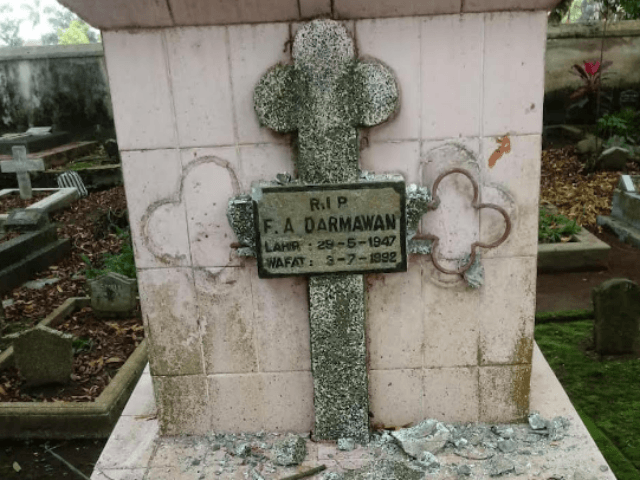The Jakarta Post on Monday reported on a rash of desecrations directed at Christian graves in the city of Yogyakarta, a spree some local residents believe was a targeted act of intolerance rather than random vandalism. A rising tide of hardline Islamism has become a major factor in the impending Indonesian presidential election.
The Jakarta Post quoted speculation from local officials that homeless people might have taken the wooden crosses from at least 11 graves in the Bethesda Hospital cemetery and used them for firewood, but the families of the deceased were skeptical, noting crosses have never been stolen before even though homeless people have long made camp near the cemetery. The wooden crosses are temporary markers placed on graves for the first thousand days after a funeral, in accordance with local custom.
One family member thought his loved one’s grave might have been desecrated to “provoke Christians living in and around Yogyakarta,” which the Jakarta Post described as a “de facto Islamic sultanate once known as a beacon of tolerance.”
Some other crosses and gravestones were vandalized last December, including the graves of 19 Christians and three Muslims. The police captured the perpetrator of one incident, describing him as a “former psychiatric hospital patient” who used a hammer to destroy a cross.
The Jakarta Post explained the Yogyakarta region is uneasy after a viral video caught Muslims refusing to rent a house to Christians in a village called Karet, based on a long-revoked local ordinance that forbids non-Muslims from owning or renting property in the village.
Indonesia, in general, has been dealing with a rising tide of Islamist intolerance after years of being hailed as a positive example of pluralism in a Muslim-majority nation. Incumbent president Joko Widodo alarmed human rights groups by tapping a 75-year-old hardline Muslim cleric named Ma’ruf Amin as his running mate in the 2019 election, which is now less than two weeks away. Widodo’s old friend and successor as governor of Jakarta, Baskuki “Ahok” Tjahaja Purnama, was jailed for blaspheming against Islam in 2017 after massive demonstrations by angry Muslims.
The optimistic take on Widodo’s re-election strategy is that he is walking a difficult line between tolerance and Islamism, hoping to win over conservative Muslim voters with a few showy displays of Muslim piety and his choice of running mate while planning to keep a more moderate course if he wins re-election. In this analysis, Widodo is no longer the secularist he used to be, but he might at least be able to hold extremist elements at bay.
The pessimistic view is that Widodo has been captured by Islamism, either becoming more of a true believer himself or concluding he can only stay in office by courting hardliners – who have grown increasingly influential among young Indonesians through social media – and giving them, through Amin, a strong hand in shaping the next Indonesian government.

COMMENTS
Please let us know if you're having issues with commenting.